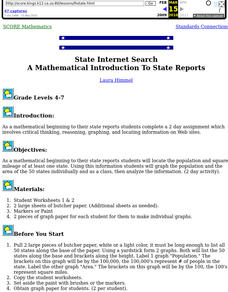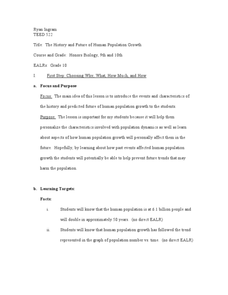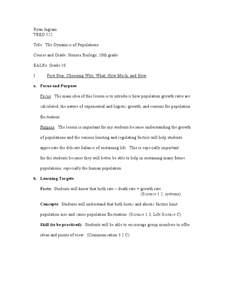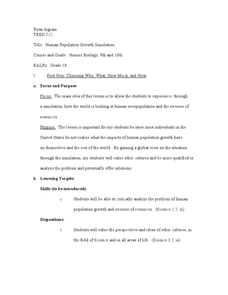Curated OER
Mark-and-Recapture
Students investigate the mark-and-recapture method for estimating the population of an animal species. They evaluate given data to answer a set of questions.
Curated OER
Whale of a Tale
Students apply problem solving techniques to answer a question. After reading a passage, they compare and contrast three species of whale in a quantitative fashion.
Curated OER
People Are Like Peas in a Pod
Students experiment with peapods to show the diversity of individual within a population. They examine dominant traits, recessive traits, genotypes, and phenotypes and show the process of making a Punnett Square.
Curated OER
Population Dynamics
Students discover how organisms are dependent on one another for survivial. They also discuss how to conserve natural resources. They compare and contrast the different types of symbiotic relationships as well.
Curated OER
Populations and Ecosystems
Sixth graders define terms prey, predator, and scavenger, describe predator-prey relationship, discuss effects of a lack of predators in an environment, and separate the role of the scavenger from that of the predator.
Curated OER
A Giraffe Debate
Young scholars study the life, adaptations, and habitats of giraffes. They investigate the issue of giraffe survival in the wild or in a wildlife sanctuary. They conduct a class debate and present position papers.
Curated OER
The Ozone Between Us
Students investigate how ground level ozone occurs in many areas of the country. They study the ozone problems that are associated with population centers.
Curated OER
A Look at the Population Density of the United States
Learners acquire census information and create maps of the population density of the United States on different scales. They role play the roles of workers of a retail company and they use the population data to market to their customers.
Curated OER
Kids Count
Students read special purpose map, use place value to hundred thousands, and write numbers to hundred thousands.
Curated OER
Map Literacy
Students locate their home state on a map. They differentiate between physical and population sizes of states. In two groups, students "become" states with string for boundaries. They ascertain that area does not always equal large...
Curated OER
The Garber Family Letters: Recreating 19th-Century Family
Students interpret primary sources and recreate the story of the Garber family.
Curated OER
Mapping Possible Solutions
Fourth graders propose possible sites for the heart of Florida state capital by mapping collected data onto a Florida state map and recording data in a Travel Log.
Curated OER
Mapping Population Changes In The United States
Students create a choropleth map to illustrate the population growth rate of the United States. They explore how to construct a choropleth map, and discuss the impact of population changes for the future.
Curated OER
Studying the States!!!
Students explore the fifty states of America. They also learn the capitals and locations of the states. They also study the population, mottos, flags, and interesting historical facts about each state.
Curated OER
State Internet Search: A Mathematical Introduction To State Reports
Students locate the population and square mileage of at least one state. Using this information students graph the population and the area of the 50 states individually and as a class, then analyze the information.
Curated OER
Pond Water Survey
For this survey worksheet students complete a series of short answers to questions on data collection, volume and populations of organisms.
Curated OER
Welcome to Populations!
Students define what population is in their own words. In this biology lesson, students explain different ways to measure population density. They interpret population graphs.
Curated OER
The History and Future of Human Population Growth
Pupils create a timeline of human population growth based on guided reading. In this biology lesson, students analyze the trend of how population increased over time. They share their findings in class.
Curated OER
The Dynamics of Populations
Tenth graders analyze the growth rate of different population. In this biology experiment, 10th graders identify the biotic and abiotic factors that limit population size. They create a poster to show their findings in class.
Curated OER
Human Population Growth Simulation
Students simulate the growth of human population. In this biology lesson, students explore different perspectives on this issue. They write a reflection at the end of the activity.
Curated OER
Bean Bugs
Students practice how to estimate the size of a population of organisms. In this estimation lesson, students hypothesize how to estimate a population of organisms. Students learn to use a quadrat system to estimate population.
Curated OER
A Sense of West Virginia
Students consider their perceptions of the world through their 5 senses while visiting the West Virginia State Museum. In this West Virginia history lesson, students discover how knowing about the past helps with their understanding of...
Curated OER
Genetic Variation
Students study families and their genetics. In this investigative instructional activity students explain how variations in genetics can be harmful and how some can help with survival.
Curated OER
U.S. Population Hits 300 Million
Students read a story about the population in the United States reaching 300 million, and answer vocabulary and comprehension questions about it. In this population lesson plan, student respond to literature by answering questions,...

























